Adventures in Theatreland (Devon’s Theatreland, that is)
It’s a special post this week focusing on the University of Exeter’s rich variety of drama clubs, theatre production companies, and performing arts societies! As you can see, whether it’s writing your own play, developing your production skills, or standing in front of the spotlight, there are all sorts of opportunities to take part in student theatre, on and off campus.
Kicking us off, playwright and performer Emily Reader (BA English), who is in her final year:
During my time at Exeter, I’ve been lucky enough to try my hand at a wide range of theatre societies in multiple capacities. One of the biggest is Footlights, a society specialising in large musical theatre productions. I have so far done two shows with them as a cellist in the band – My Fair Lady and Oklahoma! – with the latter being performed in the Northcott, our local professional theatre. Both shows have been highlights of my university experience. It is immensely rewarding to put on shows of incredibly high standards with talented students who also have their own degrees to do!I was also the cellist for an original musical, Sherwood, based on the story of Robin Hood. This was in partnership with Shotgun, the more niche musical theatre society, and Theatre With Teeth, which specialises in original student theatre. Theatre With Teeth subsequently put on a play I wrote last summer which then toured to a drama festival in Glasgow. All of these societies have gifted me unforgettable experiences that have transformed my time at Exeter. I have become obsessed with theatre and as a consequence have decided to pursue writing professionally and cello in a more amateur capacity in the future.

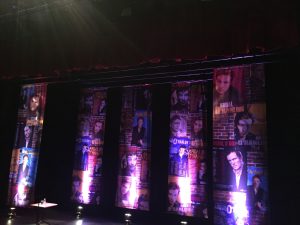

I’m an American student studying English and Drama, and know how intimidating it can be trying to enter a new theatre community. Within the first few weeks at Exeter, all the societies had their auditions in the same building. The hallway was completely hectic, as students rehearsed monologues to themselves and queued up to show their talents. It was a lot to take in, and I ended up just bouncing from room to room, trying anything and everything, until I had auditioned throughout the entire hallway, and was completely ready to fall into bed. But as I was leaving, I saw a familiar name on a door downstairs, a room separate from all the rest. “Auditions: Tennessee Williams’ Summer and Smoke”. It was the last thing I expected to see at student auditions in England, and even though I was exhausted, I knew I had to give my go at Williams. I never thought my first Southern gothic drama would take place in Exeter, England, alongside a cast of Brits, but I cannot be more thankful for my experience. It’s the only show I got a callback for, and I think it was fate that I stumbled upon Annie Bunce’s little audition room before heading out. Over the next couple months, I would spend my nights rehearsing with a talented bunch of actors, all the while making amazing friends and becoming familiar with British culture. I fell in love with the writing of Tennessee Williams because of Annie, who fell in love with him after seeing a production of Summer and Smoke in London. I was able to make Exeter feel like home by finding my own little theatre community.
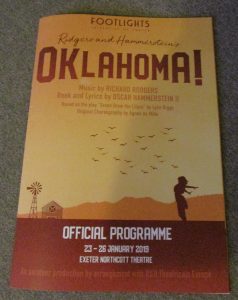
Field Trip!
We take every opportunity to knit our teaching into the resources available on campus and within the city of Exeter. A case in point is the Level 2 module Renaissance and Revolution: Seventeenth-Century Literature!
Below are some photographs from the mid-term field trip led by my colleagues Dr Jo Esra and Dr Ayesha Mukherjee. Speaking to the major theme of Renaissance and Revolution, this outing centred on the relationship between literature and local history during the Civil War. Exeter reflected the political turmoil and schisms of the period: the city was divided between royalists and parliamentarians and Exeter was twice besieged by royalist forces (it was eventually recaptured by Thomas Fairfax and parliament’s New Model Army in 1646). Exeter’s Civil War left behind a wealth of written evidence that students read before the field trip, such as pamphlets, news reports, sermons, declarations, and legal documents, including the writings of Robert Herrick and Thomas Fuller, two churchmen active in the area.
Outside Exeter Cathedral the students (and Jo) get ready for the learning to begin…
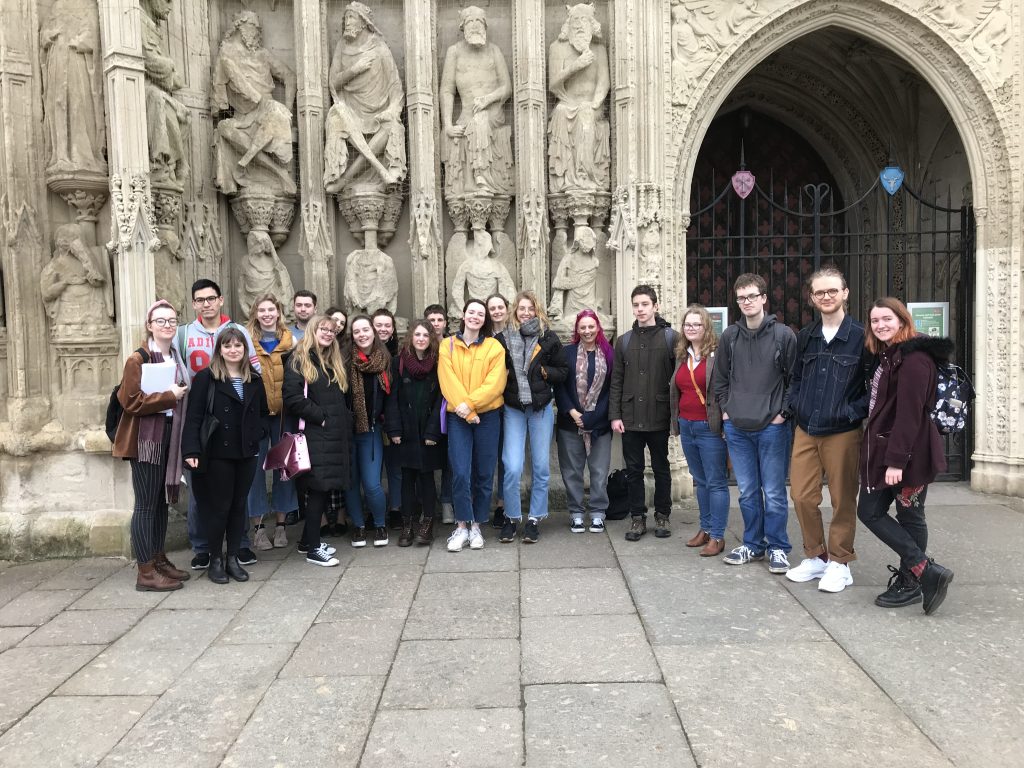
The field trip took in a variety of historic sites around the city…
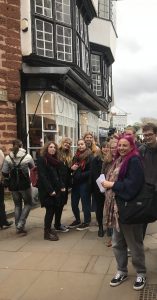
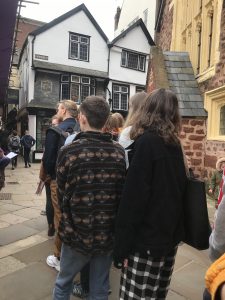
…before heading into Exeter Cathedral…
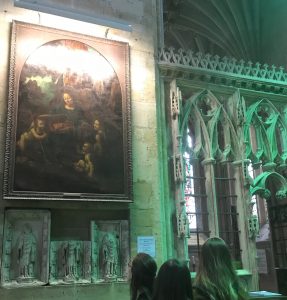
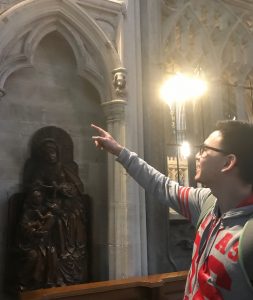
…where the students examined evidence of iconoclasm:
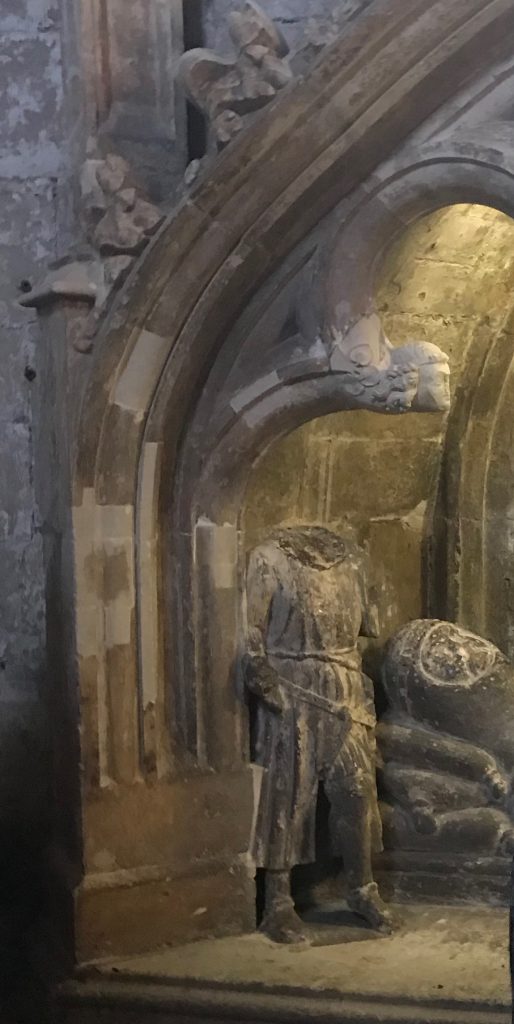
I wish I had gone myself, especially to see the cathedral’s medieval cat flap:
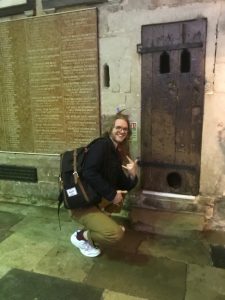
And courtesy of the Exeter Cathedral Twitter feed, here it is in action!

Mukoma Wa Ngugi and The Rise of the African Novel
This week the Department of English & Film hosted a talk by Cornell University’s Mukoma Wa Ngugi on the subject of his latest book, The Rise of the African Novel (2018). Mukoma talked about the historical exclusion of African authors who don’t write in English and the cultural costs of assuming that English is the language of aesthetic writing. As a result of this assumption, there is an incomplete archive of literary works written in African languages.
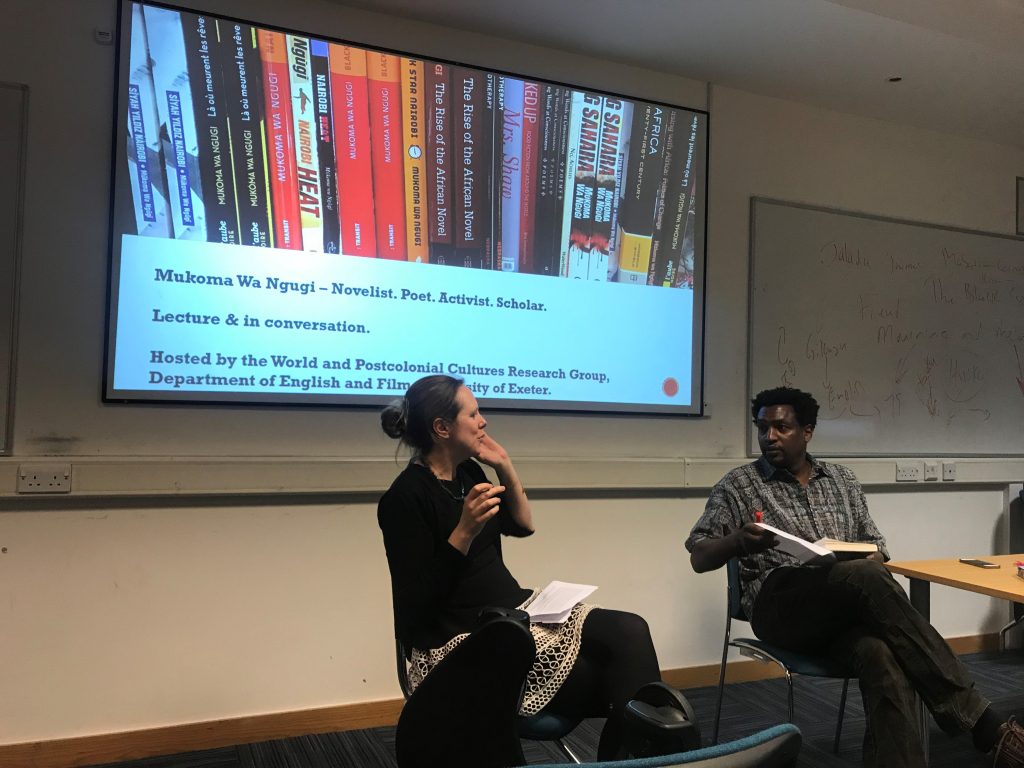
Mukoma in conversation with Dr Kate Wallis, Lecturer in Global and World Literatures
The English programme at Exeter has seen several new modules offered in the last few years so that students can study a wide range of world literature on their degree. Second-year undergraduates can take Culture, Crisis and Ecology in a Postcolonial World, which introduces students to how texts from around the globe inscribe the social, historical and environmental impact of colonialism and new forms of imperialism. In the final year students can choose Acts of Writing: From Decolonisation to Globalisation as well as specialist options such as:
- India Uncovered: Representations in Film and Fiction (this module investigates how filmic and fictional texts articulate the legacy of India’s colonial past, its postcolonial present, and diasporic experiences)
- Resource Fictions: Oil, Water and Conflict in the World-System (considering theories of world literature, postcolonial ecocriticism and world-ecology, this module invites students to examine contemporary hydro- and petro-fictions across film, poetry, and the novel)
- Encountering the Other in Medieval Literature (this module explores cross-cultural encounters and focuses on the literature of the twelfth through fifteenth centuries)
- African Narratives (which introduces students to the range and dynamism of narratives produced by African authors from 1960 to today, including online fiction)
And if you are thinking about starting an MA in September, we offer a Pathway in World and Postcolonial Cultures on our MA English Literary Studies too!
Mary McCarthy and Vassar College
Last week, we studied Mary McCarthy’s Memories of a Catholic Girlhood (1957) on an M.A. module entitled The Literature of Cold War America. McCarthy (1912-1989) died thirty years ago this October. She was one of the most important American intellectuals of her generation but is relatively understudied and taught. My colleague, Dr. Ellen McWilliams, is working on McCarthy and will discuss her in her forthcoming book, Irishness in North American Women’s Writing: Transatlantic Affinities. You can read some of Dr. McWilliams’s work on McCarthy in this January 2017 piece that appeared in the Irish Times.
For the Cold War module, McCarthy is a very interesting writer to study because she had been a “fellow traveler” in Communist circles in the 1930s. However, after the Moscow Trials and the treatment of Leon Trotsky, she severed her connections to Communism and became an anti-Stalinist liberal. She wrote about her flirtation with, and subsequent disaffection from, Communism in an article for Encounter magazine in 1954.
I also find McCarthy interesting because she’s an alumna of Vassar College in Poughkeepsie, New York, with which Exeter’s Department of English and Film has longstanding teaching and student exchanges. Most years, a staff member from English and Film goes there to teach for a semester and a colleague from Vassar’s English department comes to Exeter in exchange. I’ve been lucky enough to go there twice, from January to June 2012 and January to June 2017. In 2017, I arrived four days before the Trump inauguration!
Over the years, many students on our English with Study in North America degree have also studied at Vassar for a full academic year.
McCarthy graduated from Vassar in 1933, when it was still a women’s college (it became co-ed in 1969). Her immediate post-graduation years were thinly fictionalised in her marvelous tell-all novel, The Group (1963). Her papers are housed in the special collections at Vassar’s stunning library. Here’s me, looking very cold outside said library, in February 2017.
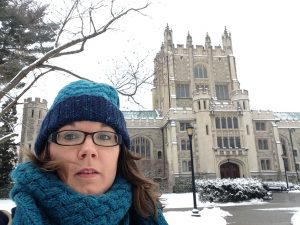
And this is the entrance to Vassar, looking decidedly less wintry, in June 2017.
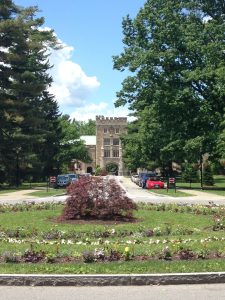
Off to Paris
The University of Exeter has a huge array of student societies covering sports, art, music, performance, film… you name it, and there is probably a society for it (yes, there IS a Hide and Seek Society).
Most relevant for the Department of English & Film, there is an English Society. In recent years they have arranged field trips, balls, talks, Christmas dinners, quizzes… you can see more info on their Facebook page.
The students certainly seem to enjoy the annual weekend break to a European city. This year it was Paris! Cue literature-themed photo opportunity:
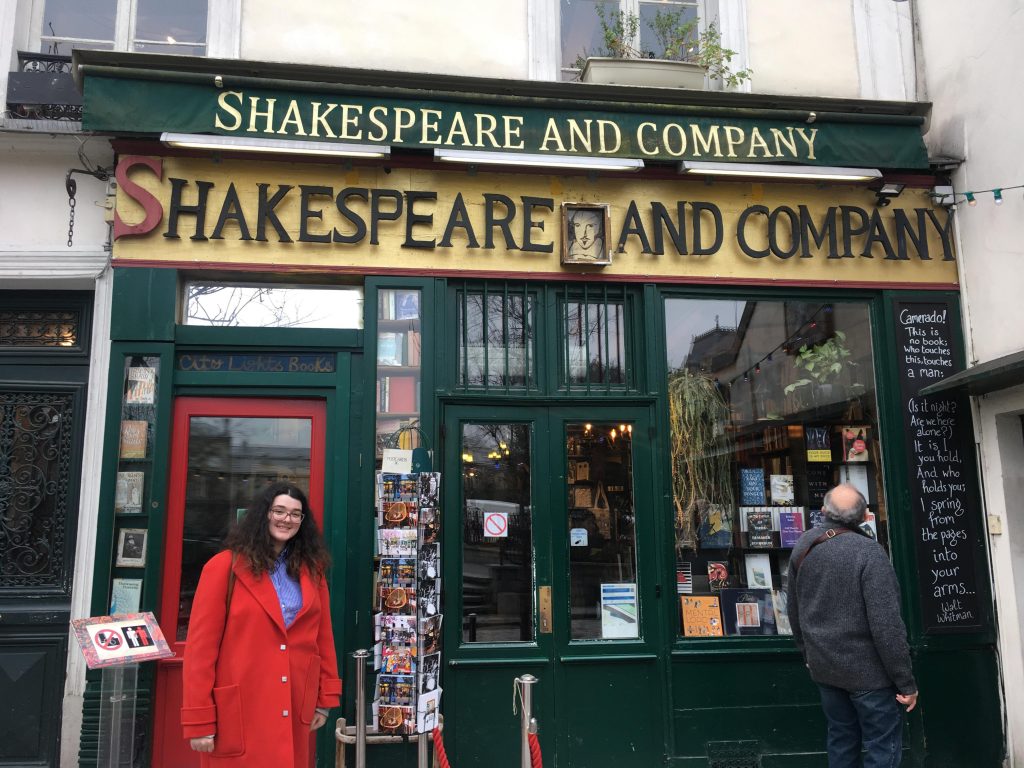
Here is first-year student Mary Helafi outside the bookshop Shakespeare and Company, where James Joyce’s Ulysses was published for the first time in its entirety in 1922. Which seems like a good opportunity to mention that my colleague Professor Vike Martina Plock convenes a third-option focusing on Joyce’s Ulysses. I didn’t make Mary visit Shakespeare and Company just so I could mention Vike’s Ulysses module – honest!
